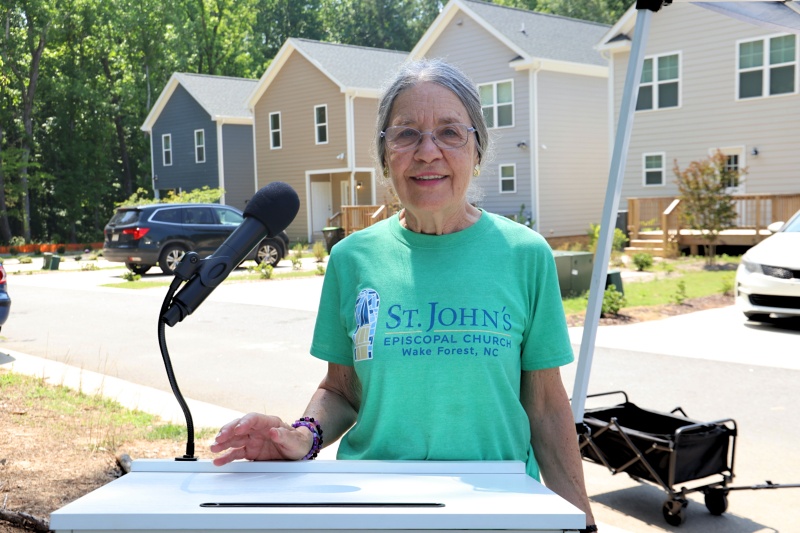
“When I first moved to Wake Forest 52 years ago, housing here looked completely different,” Kenille Baumgardner recalls. “You had university families with beautiful homes. And then there was a whole section called The Mill. They were cute little houses provided for workers, but then you realized it was two or three families per home. As you got further out from the center of town, you’d reach a large number of homes without indoor plumbing. The have and have-not divide was so apparent at that time and I think that’s what drew me to those early Habitat meetings.”
Kenille was in the room at Millbrook Baptist Church for that very first meeting—the spark that would eventually grow into Habitat for Humanity of Wake County. And though she insists she doesn’t remember much from those early days, one thing is clear: Kenille has been there for everything.
“I guess once I start on something, unless I find it’s totally not my cup of tea, I feel strongly about it and I stick to it.”
That quiet dedication has fueled more than four decades of involvement. Her church, St. John’s Episcopal, was among the early faith partners that sponsored an entire Habitat house build back in 1989. In those days, congregations took on full project management. From fundraising and securing trades to overseeing the build schedule, Kenille watched it all unfold. She witnessed, firsthand, the impact that safe, affordable housing had on her neighbors in Wake Forest.
As a longtime teacher in Wake Forest, Kenille often recognized Habitat homeowners not just as community members, but as parents of her students. “Our community was a lot smaller back then,” she says. “When a child has a place to study and sleep that is clean, that is safe—where they’re not sharing one room with multiple other siblings—you can absolutely see the difference it makes. As a teacher, I could tell.”
Though much has changed in Wake County, Kenille’s commitment to housing equity remains steadfast. Just recently, she spoke to Raleigh City Council about a site in Wake Forest under consideration for rezoning. She’s worked alongside Habitat's Faith Relations Department to build relationships in new neighborhoods, helping to ensure the work is rooted in trust and mutual respect.
And yes—you can still find her on the build site.
“I was just at the Flowers Place neighborhood painting recently,” she says with a smile. “I can’t do the framing anymore, but there are still tasks I can do.”
Looking ahead, Kenille is quick to express concern about the future of housing in Wake County. “My biggest worry is gentrification—seeing older people who’ve lived in their homes for decades priced out by rising taxes. That’s why I really value the home preservation work Habitat does. It helps people remain in place, especially those on fixed incomes who bought their homes long ago.”
Throughout our conversation, her passion for service was obvious. From housing to food access to clean water, Kenille speaks with the clarity and conviction of someone who’s been showing up for her community—not for recognition, but because it’s the right thing to do.
“I keep saying I have my finger in too many pies and need to slow down,” she laughs when asked about her many volunteer commitments. “But maybe all this is what’s keeping me going.”
As we reflect on 40 years of Habitat’s work in Wake County, we give thanks for people like Kenille—quiet leaders whose steadfast commitment makes long-term change possible.
Want to get involved? Learn more about volunteering with Habitat at habitatwake.org.